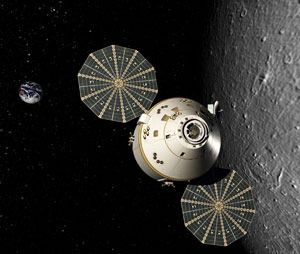I find this story so appalling and disgusting and sad that I'm going to reproduce it here in its entirety. It encapsulates not only NASA's cowardice, but the incredible stranglehold the Bush Administration has on national science. If this is what it's going to take to get back to the moon, I'd just as soon forget the whole thing. The era of American exceptionalism is dead.
The New York TimesJuly 22, 2006
NASA’s Goals Delete Mention of Home PlanetBy
ANDREW C. REVKINFrom 2002 until this year,
NASA’s mission statement, prominently featured in its budget and planning documents, read: “To understand and protect our home planet; to explore the universe and search for life; to inspire the next generation of explorers ... as only NASA can.”
In early February, the statement was quietly altered, with the phrase “to understand and protect our home planet” deleted. In this year’s budget and planning documents, the agency’s mission is “to pioneer the future in space exploration, scientific discovery and aeronautics research.”
David E. Steitz, a spokesman for the National Aeronautics and Space Administration, said the aim was to square the statement with President Bush’s goal of pursuing human spaceflight to the Moon and Mars.
But the change comes as an unwelcome surprise to many NASA scientists, who say the “understand and protect” phrase was not merely window dressing but actively influenced the shaping and execution of research priorities. Without it, these scientists say, there will be far less incentive to pursue projects to improve understanding of terrestrial problems like
climate change caused by greenhouse gas emissions.
“We refer to the mission statement in all our research proposals that go out for peer review, whenever we have strategy meetings,” said Philip B. Russell, a 25-year NASA veteran who is an atmospheric chemist at the Ames Research Center in Moffett Field, Calif. “As civil servants, we’re paid to carry out NASA’s mission. When there was that very easy-to-understand statement that our job is to protect the planet, that made it much easier to justify this kind of work.”
Several NASA researchers said they were upset that the change was made at NASA headquarters without consulting the agency’s 19,000 employees or informing them ahead of time.
Though the “understand and protect” phrase was deleted in February, when the Bush administration submitted budget and planning documents to Congress, its absence has only recently registered with NASA employees.
Mr. Steitz, the NASA spokesman, said the agency might have to improve internal communications, but he defended the way the change was made, saying it reflected the management style of Michael D. Griffin, the administrator at the agency.
“Strategic planning comes from headquarters down,” he said, and added, “I don’t think there was any mal-intent or idea of exclusion.”
The line about protecting the earth was added to the mission statement in 2002 under Sean O’Keefe, the first NASA administrator appointed by President Bush, and was drafted in an open process with scientists and employees across the agency.
In the National Aeronautics and Space Act, which established the agency in 1958, the first objective of the agency was listed as “the expansion of human knowledge of the earth and of phenomena in the atmosphere and space.”
And since 1972, when NASA launched the first Landsat satellite to track changes on the earth’s surface, the agency has been increasingly involved in monitoring the environment and as a result has been immersed in political disputes over environmental policy and spending, said W. Henry Lambright, a professor of public administration and political science at
Syracuse University who has studied the trend.
The shift in language echoes a shift in the agency’s budgets toward space projects and away from earth missions, a shift that began in 2004, the year Mr. Bush announced his vision of human missions to the Moon and beyond.
The “understand and protect” phrase was cited repeatedly by James E. Hansen, a climate scientist at NASA who said publicly last winter that he was being threatened by political appointees for speaking out about the dangers posed by greenhouse gas emissions.
Dr. Hansen’s comments started a flurry of news media coverage in late January; on Feb. 3, Mr. Griffin issued a statement of “scientific openness.”
The revised mission statement was released with the agency’s proposed 2007 budget on Feb. 6. But Mr. Steitz said Dr. Hansen’s use of the phrase and its subsequent disappearance from the mission statement was “pure coincidence.”
Dr. Hansen, who directs the Goddard Institute for Space Studies, a NASA office, has been criticized by industry-backed groups and Republican officials for associating with environmental campaigners and his endorsement of Senator
John Kerry in the 2004 presidential election.
Dr. Hansen said the change might reflect White House eagerness to shift the spotlight away from global warming.
“They’re making it clear that they have the authority to make this change, that the president sets the objectives for NASA, and that they prefer that NASA work on something that’s not causing them a problem,” he said.
Labels: The Final Frontier




